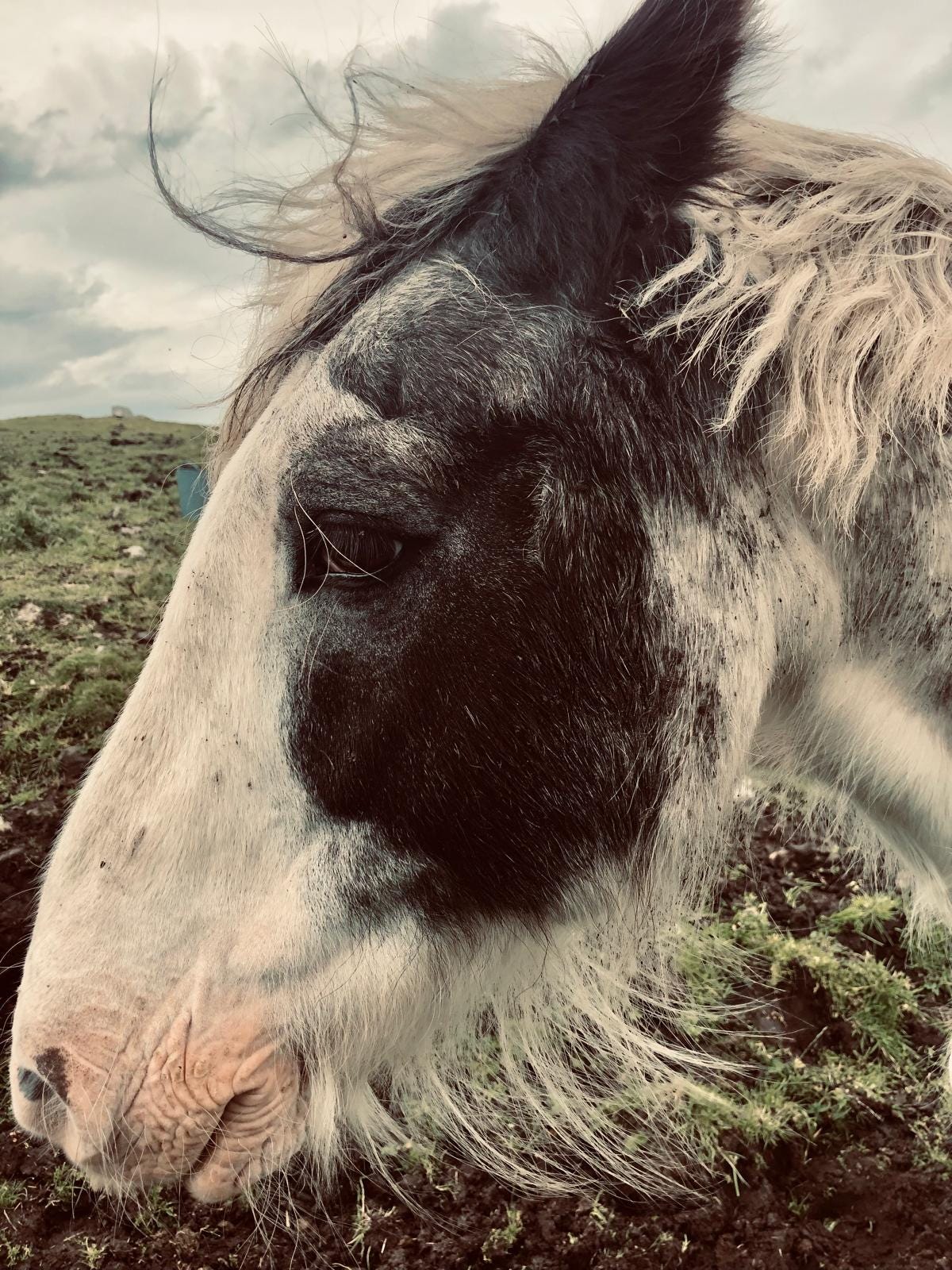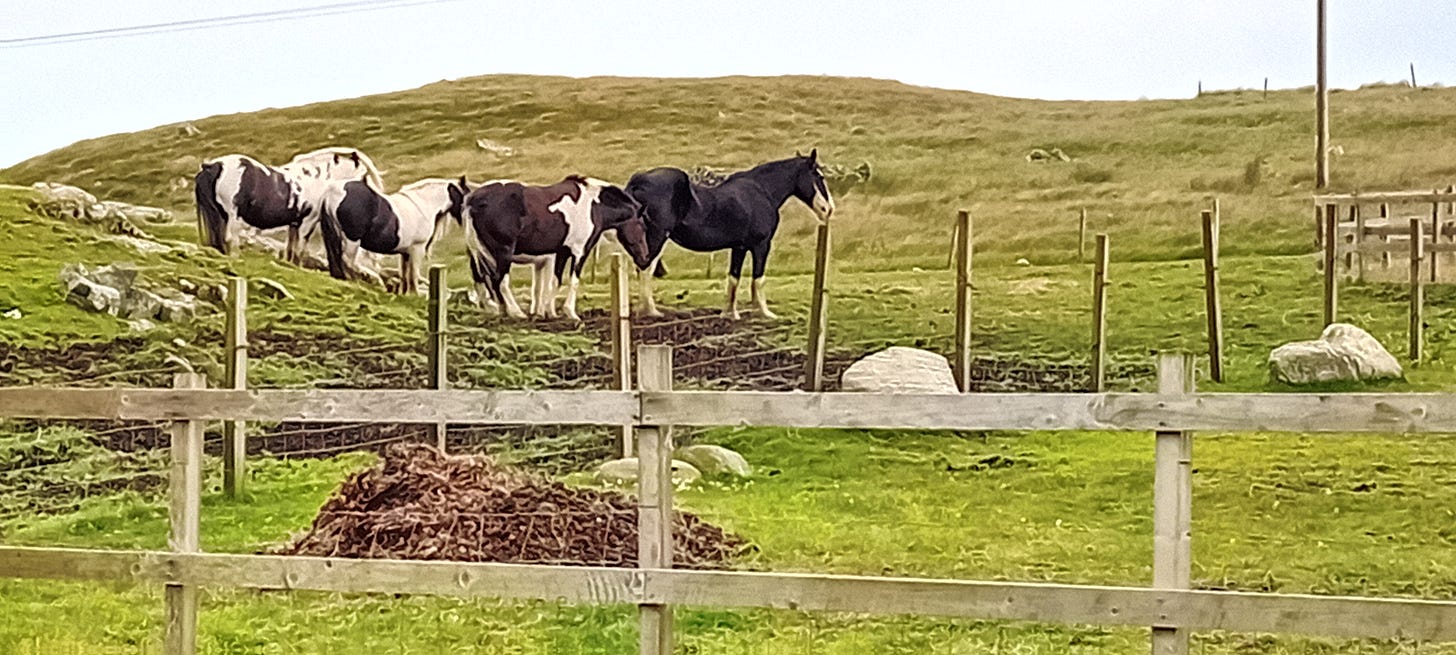Learning from Horses & Nature
My time at an Equine-Facilitated Learning Centre in the Outer Hebrides
For my summer ‘break’ this year, I felt called north-west, to the Isle of Lewis in the Outer Hebrides, to an equine facilitated learning facility (in training) and working croft. I’m here to experience crofting life and to learn about equine-facilitated personal development. Equine learning means working with horses alongside groups of people or individuals in support of their emotional, physical, and mental well-being. Just as connecting with nature can have a healing effect on our psyches and souls, so too does connecting with animals. We are all part of nature after all.
There are different forms of equine facilitated learning; some are called ‘therapy’ and some ‘personal development’ – yet they are all therapeutic. The owners here are currently completing their diploma training in equine-facilitated learning to enable them to offer one-to-one and group sessions.
From Scotland to Canada
I have a friend in Ontario, Canada, who has a herd that she works with to facilitate groups in personal development and therapy. During lockdown, she got creative and experimented to discover if connecting with horses online could benefit people. Each Wednesday, a group of us from Canada and the UK gathered over Zoom – she would be in the field with her herd so we could see them while she led us through a meditation of sorts to settle us. Then she would guide us to tune in to the horses using our sensory perception.
It’s a little hard to explain how it works online, but it did. Horses are sensitive and perceptive animals so it was possible to have a deeply moving and profound experience with her herd. When I asked my friend how the herd ‘worked,’ the herd themselves answered my question by showing me.
I felt my heart open and had a big emotional release which allowed me to let go of what I was holding onto. It felt quite humbling to experience. I was aware of the collective intelligence of the herd and experienced for myself how they worked while I sat in a cottage in Scotland while they were in a field in Canada.
To the Isles
Now, for the first time, I get to experience the wisdom of a herd in person, on a croft on the Isle of Lewis.
I’m with a menagerie of eight horses, two dogs, three cats, two geese, a flock of ducks and chickens and a herd of sheep. The land is stoney and tree-less.
Physical work brings me back to my body as I move through various aches from unfamiliar movement, but I feel satisfied at the end of a day’s work. I can see what we as a group have achieved. The stables are cleaned and the inside doors are painted a bright turquoise. Horse poo and field stones are picked up and piled in heaps. Fences are taken down and rebuilt. The ducks enjoy a hose shower as I fill their blue scallop-shaped pools for drinking and bathing. The chickens cluck loudly as I remove eggs from under their warm feathered bellies. My wellies squelch in the mud of a water ditch as I pull out the grass by hand to clear the way.
Lunch feels rewarding after a morning of physical work outdoors. A hot cup of green tea in a takeaway mug while sitting painting the stable door, never tasted so good. My cheeks are rosy from the constant wind, my eyes are brighter and I sleep like a drugged elephant.
I wake to the sounds of chickens and ducks chattering outside my cosy little caravan. Then step onto the newly built deck out the back to sit and drink tea in their company. Sometimes Archer, the very fluffy black and white cat joins me or scratches at the door of my caravan asking to be let in (he’s not allowed).
I’ve learnt that horses only sleep for two hours a day while standing up and that one horse is always alert and on guard because they are fight, flight or freeze animals. I’ve also learnt facts such as horses poo around ten times per day (I know as I’ve been poo picking while on the croft, it’s a never-ending task!).
There is much to be learnt from simply observing the herd. From noticing their movements, their ears, eyes, and sounds.
There is also much to be learnt from observing how all the animals behave and interact with each other.
We stand in anticipation, watching and waiting for the two geese, Galadriel, and Gunner, to check out their newly built pool constructed from a cut-off old plastic container. They peck and nibble the platform, testing every bit. They dip their beaks in the water, just making sure it’s something they want to try. They are hesitant, so Galadriel is grabbed and plopped into the pool to ‘break the ice.’ She doesn’t like it, flaps her huge wings, honks, and stumbles out. But, eventually, later, after much poking and experimenting, in their own time and when no one is looking, they find their way in and paddle about.
They like to be among all the activity, where people, horses or sheep are gathered. They enjoy a good chat, honking at the horses over the fence, or chasing me and poking at my wheelbarrow when I walk by.
One overcast day, I’m introduced to the smaller ponies of the herd and take part in some therapeutic grooming. I’m told that just being in the presence of ponies and horses helps to regulate and slow down our heartbeat and reduce anxiety. Trevor, my little Shetland pony, begins to nod his head, a good sign that he is relaxing.
I massage Trevor with my hands, his dark chocolate hair is coarse, oily, and salted from the Hebridean sea air. Our warm bodies press in on each other – it feels connective and cosy. My hands have a thick coating of oily dirt on them. He snorts and nibbles at a chair, the owners explain that he is helping me to release what I might be holding and ask me what I was thinking when he did that.
On another wind-swept day, two of us lead the smaller and younger ponies, Trevor, and Mitchell, from a field to the stables – I’m taught how to walk alongside him and lead. We watch them reunite with the rest of the herd after a day spent in a different paddock hanging out with the flock of sheep. The other horses come bounding over the hill, whinnying to greet them. Then, we get out of the way as they come storming in next to the barn to feed on hay. We watch their antics as they interact, the larger females nipping the others to get out of the way of their food!
What is fascinating to me, someone new to equine-facilitated learning, is how the horses interact together as a herd and as a collective. I’m told that there is a moving order of leadership in this herd – no one horse is the alpha leader, although it tends to fall between the two largest horses. Two cheeky boys are the mischief makers, a gentle little white pony with one blue eye and one brown likes her personal space and a lovely cob horse with a grunge-like black and white long mane is very cautious of humans.
One night, I stand in the light rain and watch the herd running. It looks like they are playing tag with each other – having fun. They are a joy to watch.
Interconnected Ecosystems
At night, when I lie in bed, I sense the whole ecosystem of horses, people, and other animals. A large family of beings, interconnected and all learning from each other.
Learning from other species has always interested me. I am an animal lover who sees animals as intelligent teachers from which we can learn an incredible amount. Humans tend to gauge the intelligence of other species using our own form of intelligence as a benchmark, rather than being curious about the unique ways that animals perceive and experience the world.
Now, it’s exciting to see many new books1 being published about animal intelligence. And new scientific research that can help us to understand other species better. Through entering the sensory world of other species, we can discover a new way to perceive our planet and remember our own sensory and instinctual nature.
Warmth for your week,
Jane x
I’m currently reading, An Immense World – How Animal Senses Reveal the Hidden Realms Around Us by Ed Yong.
*Photo 1: William
*Photo 2: Four of the herd
*Photo 3: Galadriel and Gunner the rare breed geese.
*I’ll be sharing more pictures of the animals and crofting life on Instagram if you’d like to see more visuals.




Hi love your story! I grew up with ponies, they were my life. Then I left the horsey world when grown up. As an older person I was ill for a long long time, and then a few years ago a healer told me: 'You have to get back to horses, they'll be your healers'. I did, and it helped so much! I used to help with 'Riding for the Disabled' near Forres. It was wonderful seeing how the ponies knew those children's needs, and seeing how the children benefitted from riding, or just being near and helping to groom the ponies. There were ponies in the field I could see from my upstairs window, and I used to go talk to them daily when we were in lockdown. I saw them almost daily for 6 years, including newborn foals. Sadly I've left there now, but still go to see them regularly, though not the same contact. (I did start volunteering with a RDA group down here, but didn't enjoy the set-up)